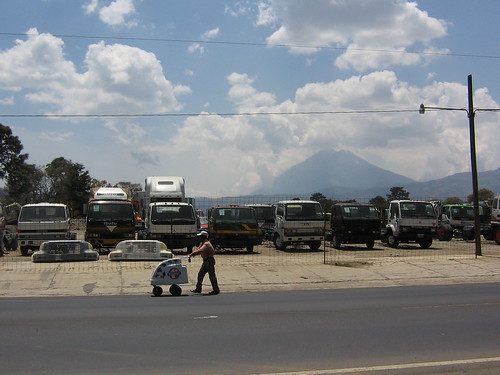"There's something that always comes back to me when I try to remember this trip. I have no idea where we were, or anything, but we were all hidden in a dumpster. I was carrying a Transformer in one hand, and I dropped it into trash. One of the polleros must have been an okay guy, because he picked up the toy and gave it back to me. Maybe he wanted to keep me from crying, to keep us from being caught.
"We went through at a place where there were a lot of drainage pipes and ditches. I don't know if we were in Tijuana, or where. I remember going into to these pipes, crossing the border, and they put us in a car and drove us to Sacramento.
"We stayed in Sacramento a year, in a place where people on all sides were immigrants. I didn't know where all of them came from, what countries, but when the patrol cars would come by we would take off running. The adults would put us kids in boxes, close the lids, and put shoes on top. They would say 'Don't move, don't cry, don't breathe.' I remember this very clearly. I also remember going out to look through the trash for toys.
"We were staying in a house with my mother's blood relatives, but they here horrible to us. They'd come from Mexico too, but they looked down on us. There's real trouble with accpetance, between groups of recently arrived immigrants and those who've been in the US for some time. They treated us really badly, no help, nothing. Our own people turned their backs on us. It was so bad, after we came back to Mexico we never spoke to that family again.
"Once my mom tried to get me into a school, but it didn't work out. I stayed with people we knew, but it was pretty tough. They would see my mother off, then say 'Go stay out on the patio, until she comes back.'"
I asked Arturo if he felt like this year in the US made improvements in his family's situation when they returned to Mexico.
"I guess I feel like it was harder. I spoke a little English. But if I'd stayed in the US I think I would have lost my identity, forgotten my town, my community, my sense of tradition. Some Mexicans ho have lived in the US for a long time say to me, 'I don't remember how to speak Spanish anymore, that's why I have to speak English.'
"I don't feel like the US lacks identity, but I wonder if Mexican identity and American identity have anything to do with one another. I know there is some common ground, but sometimes they seem like they don't go together very well. Some people up in the US think of Mexico as a country of poor people, like we're all fucked. I wonder what it would be like if I went there, if I want to go at all, if they'd think of me as an indio."
Arturo is now 22 years old. He is completing the necessary exams to become eligible for admission to the National Center of the Arts in Mexico City. His artistic focus at the moment is drawing, and the sketches I have seen are heavily crafted portraits within large areas of clean space. Arturo's attention to detail and volume in his drawing are both exquisite. He select the image below for inclusion with this text.
Arturo works at the Casa Vecina, helping with the planning and installation of
exhibitions, and he enjoys this work because of the number of interesting people he meets at the center and beneath it, in La Bota.


